Winter 2023 Newsletter
Voices from STEEP
“I think the proudest moments are always when students graduate…that’s just a very, very wonderful thing.”
STEEP Director, Rainer Lohmann, featured in the University of Rhode Island Graduate School of Oceanography’s mini-vid series, Get to Know GSO.

 Feature
Feature
Jitka Becanova, PhD, Assistant Research Professor and STEEP Senior Personnel
 “Coming here and starting with STEEP, it was really a family…people who were enthusiastic about the work we started doing…this was for me.”
“Coming here and starting with STEEP, it was really a family…people who were enthusiastic about the work we started doing…this was for me.”
In November 2022, former STEEP trainee Jitka Becanova, PhD, began her new position as Assistant Research Professor at the University of Rhode Island Graduate School of Oceanography, adding to her already impressive work as senior personnel in STEEP Project 4 (Detection Tools), an analytical lead in the DMAC core, and mentor for the RETCC core. An environmental chemist, Becanova has integrated her expertise in analytical chemistry with environmental engineering; her goal is to identify the presence of compounds of concern in the environment and help reduce human exposure.
 STEEP Sightings
STEEP Sightings
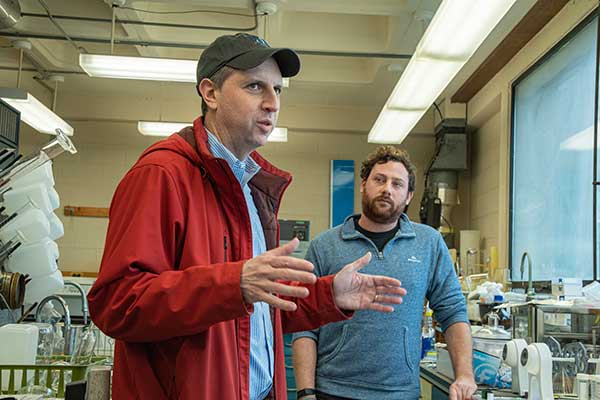
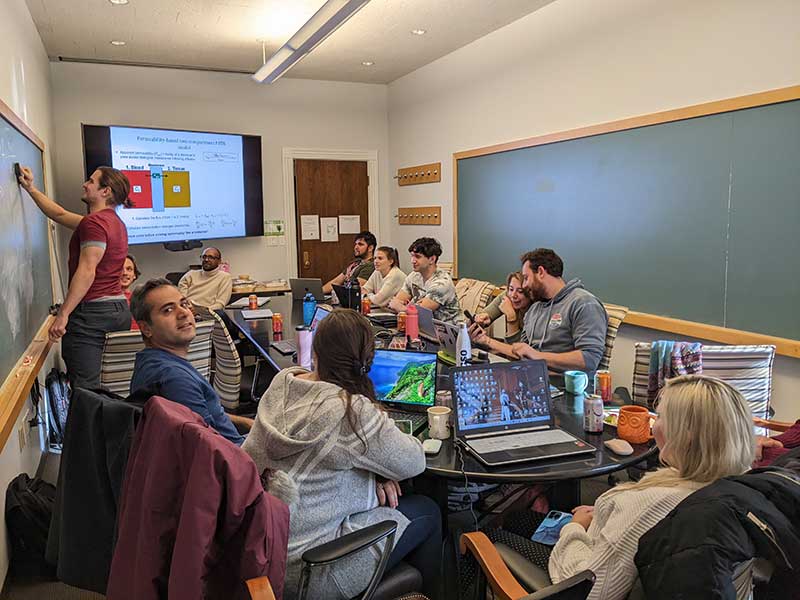
 Research Highlights
Research Highlights
Lohmann, et al. place second for the 2021 Environmental Science and Technology Best Paper Award: Addressing Urgent Questions for PFAS in the 21st Century
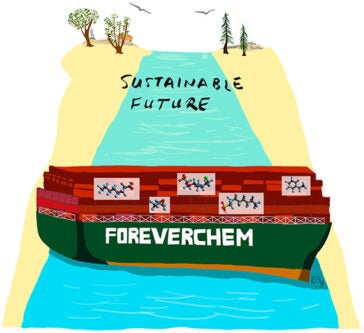 PFAS researchers collaborate on six urgent questions relevant to the what, where, how, and who of PFAS in our environment, and applicable science, technology, and policy considerations to address the problem. The paper was selected as Environmental Science and Technology (ES&T) Second Joint Winner in the Feature/Perspective/Viewpoint category. Read More…
PFAS researchers collaborate on six urgent questions relevant to the what, where, how, and who of PFAS in our environment, and applicable science, technology, and policy considerations to address the problem. The paper was selected as Environmental Science and Technology (ES&T) Second Joint Winner in the Feature/Perspective/Viewpoint category. Read More…
PFAS may target bones, according to STEEP research
 A new publication demonstrates an association between PFAS and diminished bone density in 5-year-old children. Pediatric bone density has been demonstrated to strongly track through young adulthood and possibly beyond; therefore, these prospective results may have important public health implications. Read More…
A new publication demonstrates an association between PFAS and diminished bone density in 5-year-old children. Pediatric bone density has been demonstrated to strongly track through young adulthood and possibly beyond; therefore, these prospective results may have important public health implications. Read More…
STEEP team evaluates low-cost method for confident PFAS detection in water
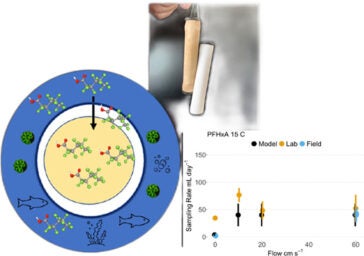
PFAS are everywhere, and in the environment, require effective and affordable discovery—passive samplers could be the solution. In addition to efficiency and cost-effectiveness, integrative passive samplers allow for time-weighted averages of PFAS water concentrations, providing a holistic view of contamination over days, tides, and seasons. Read More…
 Program Updates
Program Updates
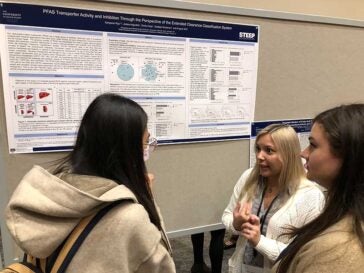
STEEP at #SRP35! A strong opening of the 35th annual SRP conference included a presentation from KC Donnelly Externship awardee and STEEP trainee Matthew Dunn. Dunn spoke to the full conference about his trip to Cyclopure in Skokie, IL, to test affordable PFAS-sorbent material for water treatment. The poster session also featured former trainee Izak Hill, current trainees Juliana Agudelo, Asta Habtemichael, and Emily Kaye, as well as CEC Co-Lead Emily Diamond, PhD., and RTC Co-Lead Jaclyn Witterschein.
- Agudelo, J., et al. Targeted quantification of perfluoroalkyl substance (PFAS) in human serum from patients evaluated for non-alcoholic fatty liver disease (NAFLD)
- Diamond, E., et al. STEEP Community Engagement Core: Evaluating & Communicating PFAS Contamination with Tribal Communities on Cape Cod
- Dunn, M., et al. Investigating a Novel Cyclodextrin Sorbent for Use Within an Integrative Passive Sampler for PFAS
- Kaye, E., et al. Evaluation of Perfluorooctanesulfonic acid absorption and tissue concentrations in Organic Anion Transporting Polypeptide 2B1 deficient mice
- Habtemichael, A., et al. From the Bottom Up: Deciphering Bioaccumulation and Biomagnification of PFAS In Plankton
- Hill, N., et al. Bioconcentration of PFAS in fathead minnows (Pimephales promelas) exposed to AFFF-contaminated Groundwater
- Hill, N., et al. Exposure to aqueous film forming foam (AFFF)-impacted groundwater alters the liver proteome in fathead minnow
- Witterschein, J., et al. STEEP: Deepening Connections through Community Engagement
 STEEP Trainee Accomplishments
STEEP Trainee Accomplishments
Supporting the Next Generation of PFAS Researchers. University of Rhode Island students Eddie Melfi, Stella Mueller, and Katie Roche created a video to feature the knowledge and accomplishments of STEEP Trainees.


Matthew Dunn
Presentation: RIDEM, RIDOH, and EPA about Rhode Island PFAS Research
Award: Ketchum Prize for Best Graduate Student Talk, New England Estuarine Research Society

Jared Snook
Accomplishment: Led STEEP’s response to the World Health Organization provisional document regarding guidelines for PFOA and PFOS in drinking water
 STEEP Speaks
STEEP Speaks
“PFAS are toxic enough that low levels can have negative impacts, but some of those effects can be especially hard to track in wildlife.” Former STEEP trainee Anna Robuck, PhD., discussing her PFAS research for Salon.
“This is a risk-benefit equation. If something makes you really happy, use it…in your 20 products, you could just pick one to three.” Elsie Sunderland, PhD., on PFAS in your home products, as quoted in WBUR interview PFAS expert tips: How to reduce your exposure to harmful ‘forever chemicals.’ Sunderland and STEEP Trainee Heidi Pickard recommend reading labels with PFAS in mind.
“…at the end of the day, it shouldn’t be on all of us as individuals to have toxic chemicals on our mind when we’re at the grocery store or buying clothes or furnishings for our homes and our families. There need to be broader level changes to enforce stricter regulations on chemicals and to keep toxic chemicals out of the marketplace.” – CEC Co-Lead Laurel Schaider, PhD., as featured on NPR’s Living on Earth.
“…In the small intestine, they’ll basically be completely absorbed into the body…within a couple of days, 100% absorbed…which is not the case for every chemical or drug.” Angela Slitt, PhD., as quoted in Tracing the path of toxic ‘forever chemicals’ inside the body with WBUR.
“PFAS are everywhere and in most animals surveyed. But collecting that information and putting it together is a huge effort. And I am not sure the general public is fully aware how thoroughly these chemicals have penetrated the environment.” STEEP Director Rainer Lohmann, PhD., as quoted in the New York Times article, How Widespread Are These Toxic Chemicals? They’re Everywhere.
Read the 2025 Issue 1 Newsletter
Read the 2024 Issue 2 Newsletter
Read the 2024 Issue 1 Newsletter
Read the Spring/Summer 2023 Newsletter
Read the Winter 2022 Newsletter
Read the Spring 2021 Newsletter

